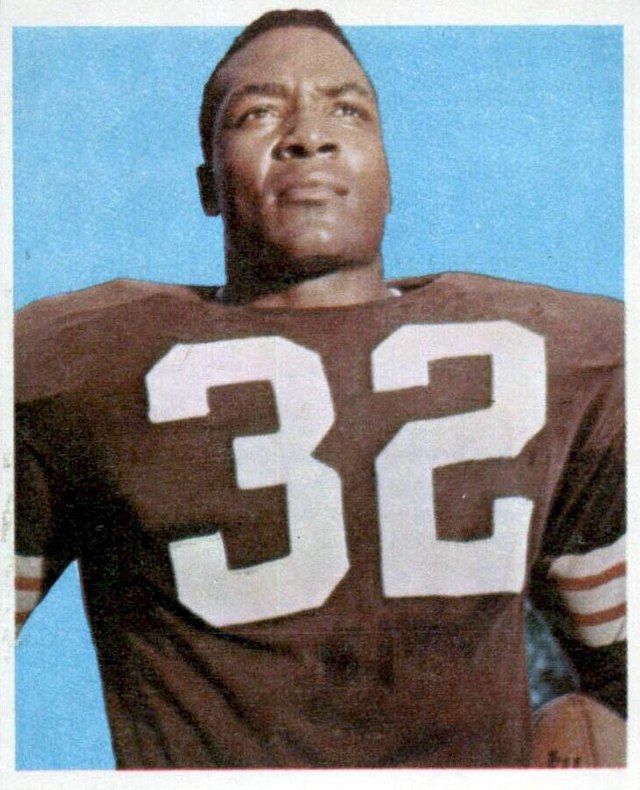In American football, rushing and passing are the two main methods of advancing the ball down the field.[1] A rush, also known as a running play, generally occurs when the quarterback hands or tosses the ball backwards to the running back,[2] but other players, such as the quarterback, can run with the ball.[1] In the National Football League (NFL), the player who has recorded the most rushing yards for a season is considered the winner of the rushing title for that season.[3] In addition to the NFL rushing champion, league record books recognize the rushing champions of the American Football League (AFL), which operated from 1960 to 1969 before being absorbed into the National Football League in 1970.[4]

The NFL did not begin keeping official records until the 1932 season.[5] Since the adoption of the 14-game season in 1961, all but one rushing champion have recorded over 1,000 yards rushing. Eight rushing champions have recorded over 2,000 rushing yards, a feat first accomplished by O. J. Simpson in 1973 and most recently achieved by Derrick Henry in 2020. [6]
The player with the most rushing titles is Jim Brown, who was the rushing champion eight times over his career. Eric Dickerson, Emmitt Smith, O. J. Simpson, Steve Van Buren, and Barry Sanders are tied for the second-most rushing titles, each having won four times. Jim Brown also holds the record for the most consecutive rushing titles with five, having led the league in rushing each year from 1957 to 1961. Steve Van Buren, Emmitt Smith, and Earl Campbell each recorded three consecutive rushing titles. The Cleveland Browns have recorded the most rushing titles with eleven; the Dallas Cowboys rank second, with seven rushing titles. The most recent rushing champion is Christian McCaffrey of the San Francisco 49ers, who led the league with 1,459 rushing yards during the 2023 season. Derrick Henry is the most recent player to win back-to-back titles.[7]
In 2022 the NFL announced, "To permanently honor the impact of Jim Brown in the NFL, the player with the most rushing yards each season will be presented with the "Jim Brown Award".[8] Josh Jacobs was the inaugural recipient.
List of NFL rushing title winners







| ^ | Pro Football Hall of Fame member |
|---|---|
| * | Player is active |
| † | Player won the AP Most Valuable Player award in the same year |
| ‡ | Player won the AP Offensive Player of the Year award in the same year |
List of AFL rushing title winners
| Season | Winner | Team | Yards | Games |
|---|---|---|---|---|
| 1960 | Abner Haynes | Dallas Texans | 875 | 14 |
| 1961 | Billy Cannon | Houston Oilers | 948 | 14 |
| 1962 | Cookie Gilchrist | Buffalo Bills | 1,096 | 14 |
| 1963 | Clem Daniels | Oakland Raiders | 1,099 | 14 |
| 1964 | Cookie Gilchrist (2) | Buffalo Bills | 981 | 14 |
| 1965 | Paul Lowe | San Diego Chargers | 1,121 | 14 |
| 1966 | Jim Nance | Boston Patriots | 1,458 | 14 |
| 1967 | Jim Nance (2) | Boston Patriots | 1,216 | 14 |
| 1968 | Paul Robinson | Cincinnati Bengals | 1,023 | 14 |
| 1969 | Dickie Post | San Diego Chargers | 873 | 14 |
Most rushing titles
| Count | Player | Seasons | Team(s) |
|---|---|---|---|
| 8 | Jim Brown | 1957–1961, 1963–1965 | Cleveland Browns |
| 4 | Eric Dickerson | 1983, 1984, 1986, 1988 | Los Angeles Rams / Indianapolis Colts |
| Barry Sanders | 1990, 1994, 1996, 1997 | Detroit Lions | |
| O. J. Simpson | 1972, 1973, 1975, 1976 | Buffalo Bills | |
| Emmitt Smith | 1991–1993, 1995 | Dallas Cowboys | |
| Steve Van Buren | 1945, 1947–1949 | Philadelphia Eagles | |
| 3 | Earl Campbell | 1978–1980 | Houston Oilers |
| Adrian Peterson | 2008, 2012, 2015 | Minnesota Vikings |
See also
Notes
- The NFL did not have a set number of games for teams to play until the 1935 season, instead setting a minimum.[10]
- The Boston Braves played 10 games in a non-standardized season.[11]
- The Boston Redskins played 12 games in a non-standardized season.[12]
- The Chicago Bears played 13 games in a non-standardized season.[13]
- The 1982 season was reduced from 16 to 9 games due to a 57-day players' strike.[14]
- The 1987 season was reduced from 16 to 15 games due to a 24-day players' strike.[14]
References
Wikiwand in your browser!
Seamless Wikipedia browsing. On steroids.
Every time you click a link to Wikipedia, Wiktionary or Wikiquote in your browser's search results, it will show the modern Wikiwand interface.
Wikiwand extension is a five stars, simple, with minimum permission required to keep your browsing private, safe and transparent.
